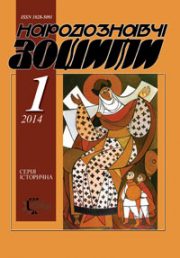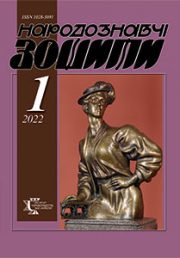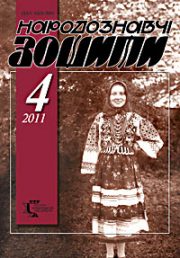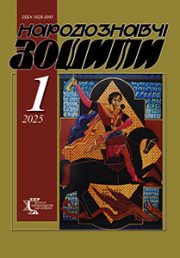The Ethnology Notebooks. 2019, № 5 (149), 1185—1190
UDK: 801.8:821.161.2:821.22(556)
DOI https://doi.org/10.15407/nz2019.05.1185
ETHNOTYPE OF HEROES IN UKRAINIAN NATIONAL DUMA AND KURDISH NATIONAL SONGS
NABOK Maryna
ORCID ID: https://orcid.org/0000-0001-9422-730X
Candidate of Philology, Docent
Sumy State University
Department of language preparation of foreign citizens
2, Rimsky-Korsakova Street, 40000, Sumy, Ukraine
е-mail: nabok.marinka@gmail.com
BESHIR Mehmet
ORCID ID:
student of the LS-329 group,
Sumy State University
2, Rimsky-Korsakova Street, 40000, Sumy, Ukraine; Turkey
Abstract. The rapid development of various forms and methods of intercultural communication requires the study and understanding of the peculiarities of the national worldview, world expression and world affirmation of particular people. The importance of this approach to the study of peoples’ national existence is, first of all, in the understanding of «native» through the prism of «foreign» and «foreign» through the prism of «native». This is the relevant of our article. It is in the process of intercultural communication that we learn culture, traditions, way of thinking of one or another nation. Semiotics explores the cultural specifics of traditional images and comparisons, the symbolism of color, names and etc.
Studying the national picture of the world of the Ukrainian and Kurdish peoples, we often avoid baseless, unscientific statements about so-called influences based on similarities of phenomena of different cultures where there are no such influences, on the other, we reach equality of participants of such communication, their interest in exchange, cultural values.
Therefore, our purpose is: based on the feedback of foreign students, we aim to analyze the peculiar perception of the warrior ethnotype in Ukrainian folk thoughts and Kurdish folk songs, to carry out its comparative analysis. For these reasons defined common and different in character, actions and deeds of these heroes. The object and subject of the research are Ukrainian folk dumas and Kurdish folk songs, national features of creating an ethnotype of a warrior of this folk works. The article uses theoretical methods: analysis, synthesis, abstraction, comparison, generalization, systematization; empirical: questioning, conversation.
In conclusions indicates that the uniqueness of worldview and understanding of the world forms is the basis of the psychological type of national hero. His unwavering fidelity to the principles and ideals, nobility, neglect of danger, love of freedom, heroism, selflessness, sacrifice in the name of the motherland, poetry of love for it, as well as a combination of heroic and dramatic, create the basis actions of this folkloric hero. This is especially important for educating the younger generation in the context of globalization processes.
Keywords: Ukrainian national dumas, Kurdish folk songs, аesthetics, nation, culture, tradition, worldview, freedom, independence.
Received 29.09.2019
REFERENCES
Nudha, H.U. (2006). In the circle of world culture. L’viv: L’vivs’kyj natsional’nyj universytet imeni Ivana Franka [in Ukrainian].
Nudha, H. (1997; 1998). Ukrainian Duma and Song in the World. L’viv: Instytut narodoznavstva NAN Ukrainy [in Ukrainian].
Nalyvajko, S. (2000). Mystery reveals Sanskrit. Kyiv: Prosvita [in Ukrainian].
Nalyvajko, S. (2004). Indo-Aryan secrets of Ukraine. Kyiv: Prosvita [in Ukrainian].
Nalyvajko, S. (2007). Ukrainian Indo-ariotyk. Kyiv: Yevshan-zillia [in Ukrainian].
Rudenko, Y. (1994). Ukrainian Cossack Pedagogy: Revival, Search, Prospects. Rіdna shkola, 5, 13—18 [in Ukrainian].
Ukrainian Folk Dumas. (1931). Kharkіv, Kyiv: Proletar [in Ukrainian].
Bratko-Kutyns’kyj, О. (1996). The phenomenon of Ukraine. Kyiv [in Ukrainian].
«Bкrоtana». Retrieved from: http://kurtce-muzik.blogspot.com/2012/03/sipan-xelat-beritan.html (Last accessed: 19.04.2019) [in Kurdish].
The Welsh book. Volkhovnik. (2002). Kyiv: Takі spravi [in Ukrainian].
«Zоlan». Retrieved from: http://www.bakanzi.com/sarki-sozu-cevirileri/ciwan-ha (Last accessed: 18.04.2019) [in Kurdish].







